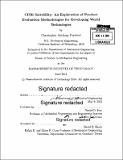CITE Suitability : an exploration of product evaluation methodologies for developing world technologies
Author(s)
Pombrol, Christopher Anthony
DownloadFull printable version (12.49Mb)
Alternative title
Comprehensive Initiative for Technology Evaluation Suitability : an exploration of product evaluation methodologies for developing world technologies
Exploration of product evaluation methodologies for developing world technologies
Other Contributors
Massachusetts Institute of Technology. Department of Mechanical Engineering.
Advisor
Daniel D. Frey.
Terms of use
Metadata
Show full item recordAbstract
There are a multitude of technological products that have been developed to improve the lives of bottom of pyramid consumers in the developing world. Unfortunately, many of these products fail to have the desired impact and there is a serious gap in knowledge of what works and what does not work. It is the goal of the Comprehensive Initiative for Technology Evaluation to fill this gap by creating a methodology for evaluating such products. This thesis documents the first efforts of the Suitability team, as part of the Comprehensive Initiative for Technology Evaluation, to develop these product evaluation methodologies. The Suitability team is focused on evaluating the technical performance of these products in a comparative manner with respect to user expectations and use patterns. Two different product evaluation frameworks were developed, implemented, and compared. The first is an attribute-based product evaluation, in the style of Consumer Reports, in which all products under evaluation are subjected to a standardized set of laboratory tests designed to differentiate among products in key performance areas. The second is a problem-based evaluation in which user feedback is gathered in order to guide product testing. Product evaluations were produced using both methods. Both user groups ranked the importance of solar lantern characteristics similarly, with a Kendall's -r coefficient of 0.4545. Each method also had unique advantages, revealing different kinds of information on solar lantern performance. This suggests that it may be useful to employ both methods simultaneously, with-the problem-based evaluation informing the attribute-based evaluation.
Description
Thesis: S.M., Massachusetts Institute of Technology, Department of Mechanical Engineering, 2014. Cataloged from PDF version of thesis. Includes bibliographical references (pages 135-136).
Date issued
2014Department
Massachusetts Institute of Technology. Department of Mechanical EngineeringPublisher
Massachusetts Institute of Technology
Keywords
Mechanical Engineering.